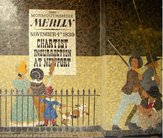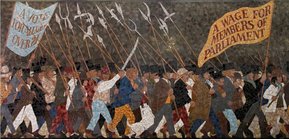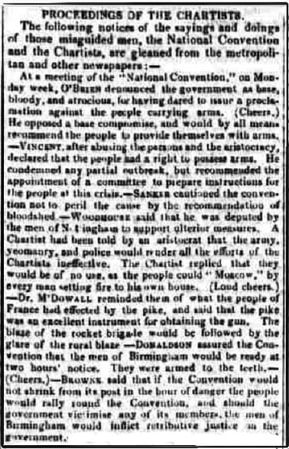MORAL & PHYSICAL FORCE CHARTISTS
Mosaic of the Newport Rising - 4th November 1839 - A massacre in which soldiers opened fire on a chartist demonstration injuring dozens and killing twenty or more.
There were a number of splinter groups in the Chartist Movement, however, the Chartists fell into two main groups: Moral and Physical Force groups. For the most part, both groups agreed on the Chartist principals of reform. Both sides preached and lectured on the inequalities of the political system and demanded change, but where they differed was in the strategy required to obtain that reform.
The Moral Force leaders were opposed to violent rhetoric or action. They advocated reform through legal and constitutional means including peaceful rallies, organized conventions, publication of newspapers and pamphlets, and petitioning. They wanted to improve the education and moral standards of the working class.
The Moral Force leaders were opposed to violent rhetoric or action. They advocated reform through legal and constitutional means including peaceful rallies, organized conventions, publication of newspapers and pamphlets, and petitioning. They wanted to improve the education and moral standards of the working class.
|
Physical Force men used hostile language. They encouraged violent behaviour with talk of arms and ultimatums against the government. Julian Harney once told an audience "A musket in one hand and a petition in the other."
Their leaders were highly critical of the moderate, Moral Force men accusing them of being traitors, agents of the middle class, and of watering down the Chartist message. Their aggressive speak appealed to the more baser instincts of the working man ... it encouraged the pack mentality and left little room for opposition or other points of view. Violent talk and violent actions during the Chartist era rarely, if ever, won the day. The Newport Rising and the Birmingham Riots ended in blood, with many injuries, deaths and imprisonments. O'Brien, Vincent, Woodhouse, McDouall, Brown, Donaldson and many other Chartists were arrested for giving inflammatory speeches. |
Physical Force men such as Feargus O'Connor and George Harney not only made personal attacks on the Moral Force men, they made veiled and misleading threats on those who did not concur with them, including boycotting shopkeepers who did not contribute funds to the 1839 General Convention. They recommended people arm themselves and resist to the death a continuance of the Poor Law, even causing a rift on the home turf of moderate John Collins by telling a crowded Birmingham meeting to 'try their right arms' to win the fight. Such misleading language by Physical Force advocates was often preceded by get-out-clauses condemning the use of force. O'Connor in particular had a knack for speaking out of both sides of his mouth: in one breath saying the people had a right to arm, and in the next saying his friends never wanted the people to use them.
|
Moral Force Men & John Collins
Men like John Collins, William Lovett, and other moderates spoke to the masses using less inflammatory language, encouraging co-operation and unity of numbers. Collins practiced diplomacy in the face of warring factions in Birmingham, and even as Physical Force leaders rose to ascendancy in the Chartist Movement he continued to promote the movement using sound argument and non-violent means. Even so, Collins and Lovett were imprisoned for telling the truth about police brutality that sparked the Birmingham Riots in July 1839. Lovett and Collins' book "Chartism, a new organization of the people" (written in Warwick Gaol) recommended education as a peaceful, positive inroad toward obtaining reform. With concerns about staying within the law and safety for the people, Collins and Arthur O'Neill declined to join the National Charter Association because they had doubts about certain of its legality. |
Eventually Feargus O'Connor and his Northern Star (with its 50,000 copies a week of Physical Force propaganda) successfully took over the Movement and drowned out the voices of Moral Force leaders and their middle class and parliamentary supporters. On 10th April 1848 he borrowed Moral Force tactics and planned a large rally and procession at Kennington Common on the scale of the Great Glasgow and Midland Demonstrations to deliver a third National Petition to parliament. He exaggerated the size of the crowd and the number of signatures on the Petition, many of which were outright forgeries such as the Queen Victoria's signature! The United Kingdom Parliament website says: "O'Connor claimed that the petition contained 5.75 million signatures. After three days, the Commons Committee for Public Petitions claimed to have counted all the signatures, and found just under 2 million."
The Moral Force leaders, with their code of conduct and strict adherence to legal means, said the third National Petition helped destroy the credibility of the Chartist Movement. Either way it heralded the demise of the movement and marked it with ridicule.
The Moral Force leaders, with their code of conduct and strict adherence to legal means, said the third National Petition helped destroy the credibility of the Chartist Movement. Either way it heralded the demise of the movement and marked it with ridicule.
|
The Three Great Chartist Petitions
To read more about the 1839 Chartist Petition on this website, including John Collins' involvement and the complete text, please click here. For further information about the Chartists' 1842 and 1848 Petitions go to the United Kingdom Parliamentary website by clicking here www.parliament.uk/about/living-heritage/transformingsociety/electionsvoting/chartists/case-study/the-right-to-vote/the-chartists-and-birmingham/1842-and-1848-chartist-petitions/ |



